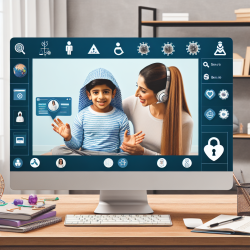Introduction
The COVID-19 pandemic has significantly altered the lifestyles of children worldwide. A recent study titled "Physical Activity, Screen Time, Sedentary and Sleeping Habits of Polish Preschoolers during the COVID-19 Pandemic and WHO’s Recommendations: An Observational Cohort Study" sheds light on these changes among Polish preschoolers. This blog aims to help practitioners leverage these findings to improve children's health outcomes.
Key Findings
The study observed a marked decrease in physical activity and an increase in screen time among preschoolers during the pandemic. Prior to the pandemic, only 30.77% of children met the World Health Organization (WHO) criteria for physical activity. This percentage decreased further during the pandemic. The study also found an increase in sedentary behavior, with children spending more time sitting. Interestingly, sleep duration increased by 10-18%, although this did not necessarily equate to better sleep quality.
WHO Recommendations
The WHO recommends that children under five engage in at least 180 minutes of physical activity daily, including 60 minutes of moderate to vigorous activity. Screen time should be limited to one hour per day, and children should sleep 10-13 hours per night. The study's findings highlight the challenges of meeting these recommendations during the pandemic.
Implementing Research Findings
Practitioners can play a crucial role in mitigating the negative impacts of increased screen time and reduced physical activity. Here are some strategies based on the study's findings:
- Encourage Physical Activity: Suggest creative indoor activities that promote movement, such as dance parties or obstacle courses. Encourage parents to incorporate outdoor activities like biking or playing ball games.
- Limit Screen Time: Educate parents on setting boundaries for screen use and encourage them to model healthy screen habits.
- Promote Healthy Sleep Habits: Share tips with parents on establishing a consistent bedtime routine and creating a sleep-friendly environment.
Further Research
While this study provides valuable insights, further research is needed to explore long-term effects and develop comprehensive strategies for promoting healthy lifestyles in young children. Practitioners are encouraged to stay informed about emerging research and integrate evidence-based practices into their work.
Conclusion
The pandemic has presented unique challenges to maintaining healthy lifestyles for preschoolers. By understanding and applying research findings, practitioners can support families in fostering environments that promote physical activity, limit screen time, and ensure adequate sleep. These efforts are crucial for the healthy development of children.
To read the original research paper, please follow this link: Physical Activity, Screen Time, Sedentary and Sleeping Habits of Polish Preschoolers during the COVID-19 Pandemic and WHO’s Recommendations: An Observational Cohort Study.










